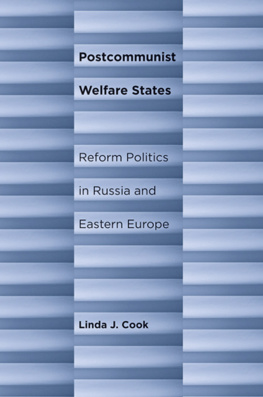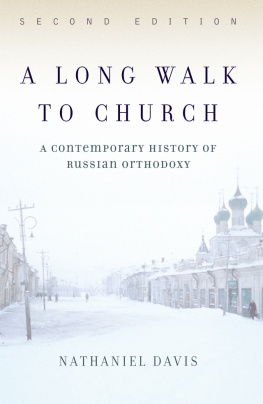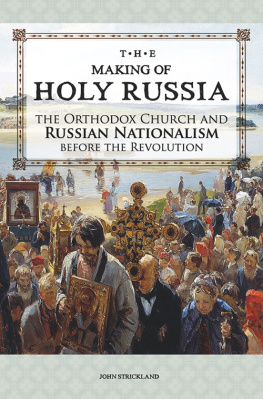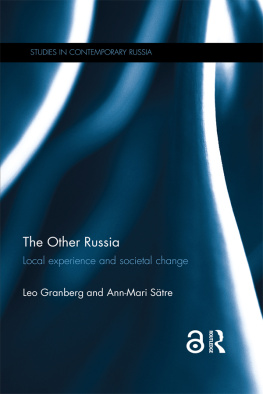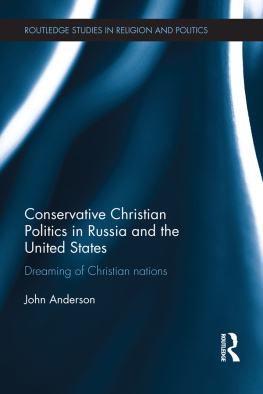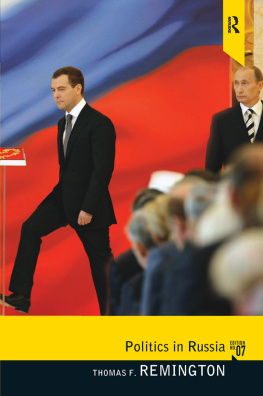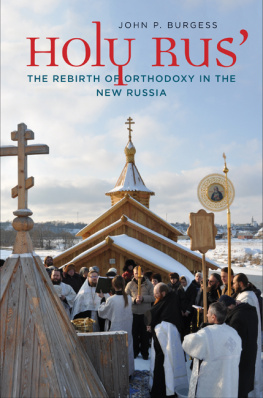
Religion and Politics in Contemporary Russia
Based on extensive original research at the local level, this book explores the relationship between Russian Orthodoxy and politics in contemporary Russia. It reveals close personal links between politicians at the local, regional and national levels and their counterparts at the equivalent level in the Russian Orthodox Church priests and monks, bishops and archbishops who are extensively consulted about political decisions. It outlines a convergence of conservative ideology between politicians and clerics and also highlights that, despite working closely together, there are nevertheless many tensions. The book examines in detail particular areas of cooperation and tension: reform to religious education and a growing emphasis on traditional moral values, the restitution of former church property and the introduction of new festive days. Overall, the book concludes that there is much uncertainty, ambiguity and great local variation.
Tobias Kllner is Senior Research Fellow at the Witten Institute for Family Business at Witten/Herdecke University, Witten, Germany.
Routledge Religion, Society and Government in Eastern Europe and the Former Soviet States
Series Editor
Lucian Leustean is Reader in Politics and International
Relations at Aston University, Birmingham,
United Kingdom.
This Series seeks to publish high quality monographs and edited volumes on religion, society and government in Eastern Europe and the former Soviet States by focusing primarily on three main themes: the history of churches and religions (including, but not exclusively, Christianity, Islam, Judaism and Buddhism) in relation to governing structures, social groupings and political power; the impact of intellectual ideas on religious structures and values; and the role of religions and faith-based communities in fostering national identities from the nineteenth century until today.
The Series aims to advance the latest research on these themes by exploring the multi-facets of religious mobilisation at local, national and supranational levels. It particularly welcomes studies which offer an interdisciplinary approach by drawing on the fields of history, politics, international relations, religious studies, theology, law, sociology and anthropology.
11 Orthodox Revivalism in Russia
Driving Forces and Moral Quests
Milena Benovska
12 The Albanian Orthodox Church
A Political History, 1878-1945
Ardit Bido
13 Orthodox Christianity and the Politics of Transition
Ukraine, Serbia and Georgia
Tornike Metreveli
14 Religion and Politics in Contemporary Russia
Beyond the Binary of Power and Authority
Tobias Kllner
www.routledge.com/Routledge-Religion-Society-and-Government-in-Eastern-Europe-and-the-Former-Soviet-States/book-series/CEE
Religion and Politics in Contemporary Russia
Beyond the Binary of Power and Authority
TobiasKllner
First published 2021
by Routledge
2 Park Square, Milton Park, Abingdon, Oxon OX14 4RN
and by Routledge
52 Vanderbilt Avenue, New York, NY 10017
Routledge is an imprint of the Taylor & Francis Group, an informa business
2021 Tobias Kllner
The right of Tobias Kllner to be identified as author of this work has been asserted by him in accordance with sections 77 and 78 of the Copyright, Designs and Patents Act 1988.
All rights reserved. No part of this book may be reprinted or reproduced or utilised in any form or by any electronic, mechanical, or other means, now known or hereafter invented, including photocopying and recording, or in any information storage or retrieval system, without permission in writing from the publishers.
Trademark notice: Product or corporate names may be trademarks or registered trademarks, and are used only for identification and explanation without intent to infringe.
British Library Cataloguing-in-Publication Data
A catalogue record for this book is available from the British Library
Library of Congress Cataloging-in-Publication Data
A catalog record for this book has been requested
ISBN: 978-1-138-35468-5 (hbk)
ISBN: 978-0-429-42463-2 (ebk)
Typeset in Times New Roman
by Apex CoVantage, LLC
To my wife Sabine
The initiative for the research project was triggered by my PhD research in the Russian Federation. During 2006 and 2008, I conducted fieldwork among Russian businesspeople and noticed their role in facilitating and brokering both Russian Orthodoxy and politics. Based on these findings, the current research was interested in the relation between Russian Orthodoxy and politics in a broader perspective. How do both spheres relate to one another? In short, I was interested in how Russian Orthodoxy and politics were influencing, reinforcing, impeding, inhibiting and entangling with one another.
After five years without proper fieldwork in Russia, I came back to Russia in 2013 and noticed continuities and differences. In the meanwhile, Vladimir Putin was succeeded as president by Dmitrii Medvedev only to reinstall himself as president again in 2012. At first glance, this indicated a lot of continuities in the political sphere. Vice versa, the Russian Orthodox Church seemed to be changing. The long-term Patriarch Aleksii II passed away in late 2008 and was succeeded by Kirill (Gundiaev) who initiated a number of reforms. To be sure, remarkable developments had taken place in the meanwhile, and the relation between Russian Orthodoxy and politics had changed considerably: military chaplains were authorized in 2009, religious education in public schools was introduced in 2012 and a Presidential Directive legitimating the restitution of property to religious organizations confiscated by the Soviets was released in 2009. Keeping these tremendous changes in mind, the current book is an attempt to better understand how Russian Orthodoxy and the political sector interact with one another by using the ethnographic method.
Of course, such a research project would have been impossible without the sincere help and generous support from so many persons and institutions. To begin with, I would like to thank the German Research Association DFG for the funding of the project (KO 46521/1).
In addition, I would like to thank all those who gave their input, shared their ideas with me and contributed their helpful criticism. To name just a few, I would like to thank Chris Hann, Bernhard Streck, Alexander Agadjanian, Heiko Schrader, Heike Ohlbrecht, Monika Wohlrab-Sahr, Jochen Tpfer, Mathijs Pelkmans, Zoe Knox, Stella Rock, Boris Knorre, Vasilios Makrides, Agata adykowska, Detelina Tocheva, Tnde Komromi and Milena Benovska-Sabkova. Moreover, I am deeply indebted to Jennifer Cash who helped me to improve my English and for criticizing me when I was taking too much of a detour in my argumentation. Thank you all very much for your insightful comments and helpful criticism during the whole analysis and writing-up process!


